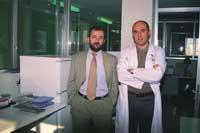Clinical trials in Vitoria-Gasteiz
1998/11/01 Elhuyar Zientzia Iturria: Elhuyar aldizkaria
bodily benefit, adverse reactions that can be noticed in the body, etc. There are already more than 200 people registered as volunteers, most of them university students.
Pharmaceutical Development Unit

The Clinical Trials Unit, created at Txagorritxu Hospital, is part of a project that began a couple of years ago. Two years ago, in 1997, the Pharmaceutical Development Unit was created in Txagorritxu, on the initiative of three institutions: Txagorritxu Hospital; Pharmacy and Pharmaceutical Technology Laboratory of the Faculty of Pharmacy of the University of the Basque Country and Leia Foundation, Technological Development Center of the Technological Park of Miñano.
The main objective of the Pharmaceutical Development Unit was to conduct research for the pharmaceutical industry, from the characterization of pharmaceutical raw materials to the development of generic drugs, through the development of drugs from the moment of design to the phase of clinical trials.
In the pharmacy faculty, raw materials are characterized, pharmacokinetic studies are carried out, generic drug design is prepared and analytical techniques are studied. "When the word characterization is used," says José Luis Pedrat, Director of the Pharmaceutical Development Unit and Professor at the Faculty of Pharmacy, "it is about knowing the composition of drugs, how it looks from the point of view of the quality defined in pharmacopoeia, whether the drug is clean or not, etc., to establish in some way the characteristics and peculiarities of the drug, in a few words."
The work carried out at the Faculty of Pharmacy continues at the Leia Foundation, in the Technological Park of Miñano. The aim of the Leia Foundation is to install a semi-industrial drug production center for the production of drugs for the Clinical Trials Unit. Also, there is the quality unit that issues the certificate of quality of medicines. The project is completed with the Txagorritxu Clinical Trials Unit mentioned in the introduction, where the investigation of the drug condition is carried out.
Clinical Trials Unit

The clinical trial is a science and medicine tool that measures and studies the influence of substances or drugs on humans. Clinical trials analyze the influence of a particular subject on the human body, its assimilation, its kinetic characteristics, its bodily benefit, adverse reactions that can be noticed in the body, etc. According to Antonio Cuadrado, head of the Clinical Trials Unit at the Txagorritxu Hospital in Vitoria-Gasteiz, "finally is the follow-up of a new molecule that will be produced for health purposes. In the development of a drug, since the molecule is synthesized until it starts to be tested in humans, it must go through different investigations, toxicomas, chemical research, etc. First it is tested with animals and then, when it is seen to have beneficial effects for animals or to give indications of it, it begins to investigate with humans."
In the field of clinical trials there is a classification that divides clinical trials into four phases. The phases are flexible, since many times the initial phases are used in combination with other endings, or vice versa, which is done to analyze the effect of drugs in special situations. Initiation studies are used in human pharmacology, while more advanced studies are used in therapeutic research.
The Txagorritxu Unit is the unit of the first phase. This means that the first stages of the development of a new molecule or drug are analyzed. The analysis itself focuses on studies of pharmacokinetics, absorption (how the body captures, how the ingested is distributed, how it can be destroyed…), analysis of the first effects on the human body (pharmacodynamics), definition and identification of the safety profile (drug toxicity) and dosing tests (providing different amounts).

According to Antonio Cuadrado, the greatest work of this type of units, especially for the policy of pharmaceutical expenses, is due to bioequivalence tests, which is the requirement to develop new generic basic levels. "There are laboratories that invest capital from the beginning of molecular synthesis to its commercialization. The work of these laboratories is supported by a 10-year patent. Once this patent is completed, any other interested laboratory can market this molecule without incurring research and development costs.
Therefore, you may have the possibility to sell the molecule at a lower price. The laboratory that aims to market this molecule, by synthesis, produces the same active principle, in the same quantity and normally with the same composition. A condition must be met, the study of bioequivalence, that is, to compare the already existing drug on the market with the new drug that is to be marketed. It is what is to be done primarily in this Unit. We will normally work with known drugs, although pharmacokinetics and tolerance research can also be done."
However in the Hospital, other tests are carried out outside this Unit to check if the drugs that until now were used are better than those recently taken.
Volunteering at the base of the Unit
These investigations will be carried out using volunteers, that is, the spirit, because for ethical reasons it cannot be done with patients. However, in some therapeutic groups trials are performed with patients, because the subjects can be especially toxic in oncological treatments, etc.
To volunteer, a minimum is required: being healthy, aged 18 to 30, not having allergies, having relaxed lifestyle habits, not smoking and not drinking much. They say that homogeneity is necessary to carry out this type of research, so volunteers are asked to meet these minimum characteristics.
Those on offer are explained what the trial will be, who drives it, the characteristics of the drug to be tested, the possible adverse effects it may have, the tests to be done, are insured and offered the possibility to ask questions.

Once this is done, if it is decided to continue, the conformity document of both parties is signed, in which it is authorized to test the drug with them. The volunteer, even if he decides to continue, has the opportunity to suspend the investigation at the time and whenever he wishes.
After approving the research, the volunteer is listed. One day he receives a call to the hospital and takes the medication in the hospital. Blood will be taken to check the reaction of the drug in the body. The volunteer must remain hospitalized for about eight hours and, if desired, can stay overnight. They will take you tension, make you electrocardiograms, be monitored during your stay and ask if you feel anything foreign.
The next day they will draw blood and return home. A period (7-15 days) will be left for the body to clean the medicine. After the deadline, take the medicine again and the process will be repeated. In the end, tests will be done to check that everything is normal. There are already more than 200 people registered as volunteers, most of them university students.
These people will have the opportunity to meet the Clinical Trials Unit of Txagorritxu Hospital. The unit is located on the 4th floor of the Hospital. 12 beds, distributed in four rooms, all empty and with oxygen outlets. Next to it is the volunteer analysis room, volunteer living room, archive and sample analysis laboratory, as well as recovery tools. The Unit's work team consists of the Director, two nurses, a doctor and a pharmacist.
Two studies between hands

Despite the good results of the trials, the opinion of the staff of the Unit is not enough to allow the use of a drug. There are a couple of stops prior to marketing: authorization from the ethical commission of the hospital research department (assessing the clinical part of the work done in the hospital) and the Pharmacy Department for the second time. The latter performs an evaluation of the work done and the drug. If you feel you have a guarantee, it will continue.
At this time this new Txagorritxu service has two studies: one against hypertension and another antibiotic. Approved already by the Ethics Committee of the Hospital and awaiting authorization from the Pharmacy Directorate. Both are commissioned by private companies. If there is no problem, these will be the first results of the new service.

Gai honi buruzko eduki gehiago
Elhuyarrek garatutako teknologia





